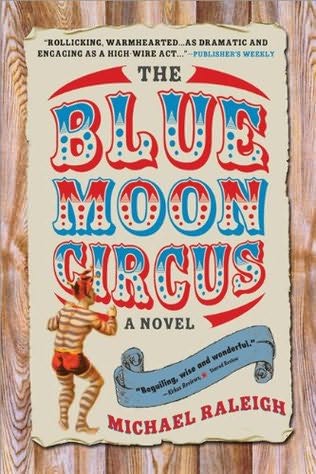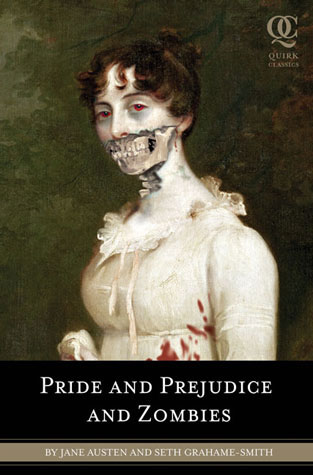I'm on a Circus novel kick right now, for some strange reason...
I am reading,

I just finished;

The Circus in winter was really melancholy, but reminded me of the Magical Realism style of South American writers like Gabriel Garcia Marquez...it really reminded me of one of my favorite novels, written by Marquez, 100 Years of Solitude. Which I think I'd due for my every few years re-read.

It actually has my favorite opening line of any book (no it ain't "it was a dark and stormy night.")
I am reading,

Lewis Tully, the proud, resilient protagonist of Raleigh's rollicking, warmhearted seventh novel, ekes out a living managing a circus in Oklahoma circa 1919, even though his Blue Moon Circus and Menagerie is prone to hardships devastating enough to shut down show after show. A catastrophic flood is the latest disaster, forcing Tully to retire permanently. Fast-forward to 1926, when Tully is being tried in court for gambling at a speakeasy. The judge (a family friend) suspends his jail sentence with the stipulation that Lewis return to circus life for one more try. With confidence that mounts as the story gains momentum, Tully manages to round up most of his original group of performers, including an aging but agile posse of clowns, a pack of feisty animal acts, a terrifyingly unique snake charmer, a red-haired ape, and mind reader Harley Fitzroy, "the greatest magician there ever was." Along for the ride is nine-year-old Charlie, a new arrival in Tully's life since Tully's sister Alma can no longer care for the boy. Despite the threats of a rival circus owner, vindictive Hector Blaney, and the memory of past failures, Lewis bravely takes his show on the road. Dozens of successful performances across the Western states buoy his spirits, but then Hector Blaney's henchmen try to sabotage the campground. It is another natural disaster, however, that delivers the final blow to Lewis's circus career. As dramatic and engaging as a high-wire act, the novel combines honest storytelling with down-home wit. There's plenty of smartly written, feel-good fun under this big top.
I just finished;

Day's debut collection spins graceful, elegant circles around the inhabitants of Lima, Ind.especially the acrobats, clowns and circus folk of the Great Porter Circus who spent their winters there from 1884 to 1939. The poignant opening tale reveals how Wallace Porter, distraught by the death of his beloved wife, came to own his eponymous menagerie. The second, "Jennie Dixianna," introduces the dazzling, tricky Jennie, who wears her wound from her Spin of Death act "like a talisman bracelet, a secret treasure" and plots her way into Wallace's heart. Other stories tell of the young black man who plays at being an African pinhead; the son of a trainer killed by his circus elephant; the flood that devastated the circus. Thanks to finely observed details and lovely prose, each of these stories is a convincing world in miniature, filled with longing and fueled by doubt. Day, who grew up in a town like Lima and descends from circus folk herself, uses family stories, historical research and archival photographs to weave these enchantments. Though her stories often contain tragedy and violencedeath in childbirth or from floodwater, cancer, circus mishapthey're also full of beauty. In "The Bullhook," Ollie, a retired clown, spends long decades with his frigid wife, waiting, armed with his father's bullhook, for death to come for him. In "Circus People," Ollie's granddaughter reflects on her fellow itinerant academics, "my latest circus family," and muses about people all over America who leave the place they grew up: "when the weather and the frequency are just right, we can all hear our hometowns talking softly to us in the back of our dreams."
The Circus in winter was really melancholy, but reminded me of the Magical Realism style of South American writers like Gabriel Garcia Marquez...it really reminded me of one of my favorite novels, written by Marquez, 100 Years of Solitude. Which I think I'd due for my every few years re-read.

It actually has my favorite opening line of any book (no it ain't "it was a dark and stormy night.")
"Many years later, as he faced the firing squad, Colonel Aureliano Buendía was to remember that distant afternoon when his father took him to discover ice."
It is typical of Gabriel García Márquez that it will be many pages before his narrative circles back to the ice, and many chapters before the hero of One Hundred Years of Solitude, Buendía, stands before the firing squad. In between, he recounts such wonders as an entire town struck with insomnia, a woman who ascends to heaven while hanging laundry, and a suicide that defies the laws of physics:
A trickle of blood came out under the door, crossed the living room, went out into the street, continued on in a straight line across the uneven terraces, went down steps and climbed over curbs, passed along the Street of the Turks, turned a corner to the right and another to the left, made a right angle at the Buendía house, went in under the closed door, crossed through the parlor, hugging the walls so as not to stain the rugs, went on to the other living room, made a wide curve to avoid the dining-room table, went along the porch with the begonias, and passed without being seen under Amaranta's chair as she gave an arithmetic lesson to Aureliano José, and went through the pantry and came out in the kitchen, where Úrsula was getting ready to crack thirty-six eggs to make bread.
"Holy Mother of God!" Úrsula shouted.
The story follows 100 years in the life of Macondo, a village founded by José Arcadio Buendía and occupied by descendants all sporting variations on their progenitor's name: his sons, José Arcadio and Aureliano, and grandsons, Aureliano José, Aureliano Segundo, and José Arcadio Segundo. Then there are the women--the two Úrsulas, a handful of Remedios, Fernanda, and Pilar--who struggle to remain grounded even as their menfolk build castles in the air. If it is possible for a novel to be highly comic and deeply tragic at the same time, then One Hundred Years of Solitude does the trick. Civil war rages throughout, hearts break, dreams shatter, and lives are lost, yet the effect is literary pentimento, with sorrow's outlines bleeding through the vibrant colors of García Márquez's magical realism. Consider, for example, the ghost of Prudencio Aguilar, whom José Arcadio Buendía has killed in a fight. So lonely is the man's shade that it haunts Buendía's house, searching anxiously for water with which to clean its wound. Buendía's wife, Úrsula, is so moved that "the next time she saw the dead man uncovering the pots on the stove she understood what he was looking for, and from then on she placed water jugs all about the house."
With One Hundred Years of Solitude Gabriel García Márquez introduced Latin American literature to a world-wide readership. Translated into more than two dozen languages, his brilliant novel of love and loss in Macondo stands at the apex of 20th-century literature. --Alix Wilber








![Craft A Brew - Safale S-04 Dry Yeast - Fermentis - English Ale Dry Yeast - For English and American Ales and Hard Apple Ciders - Ingredients for Home Brewing - Beer Making Supplies - [1 Pack]](https://m.media-amazon.com/images/I/41fVGNh6JfL._SL500_.jpg)


















































